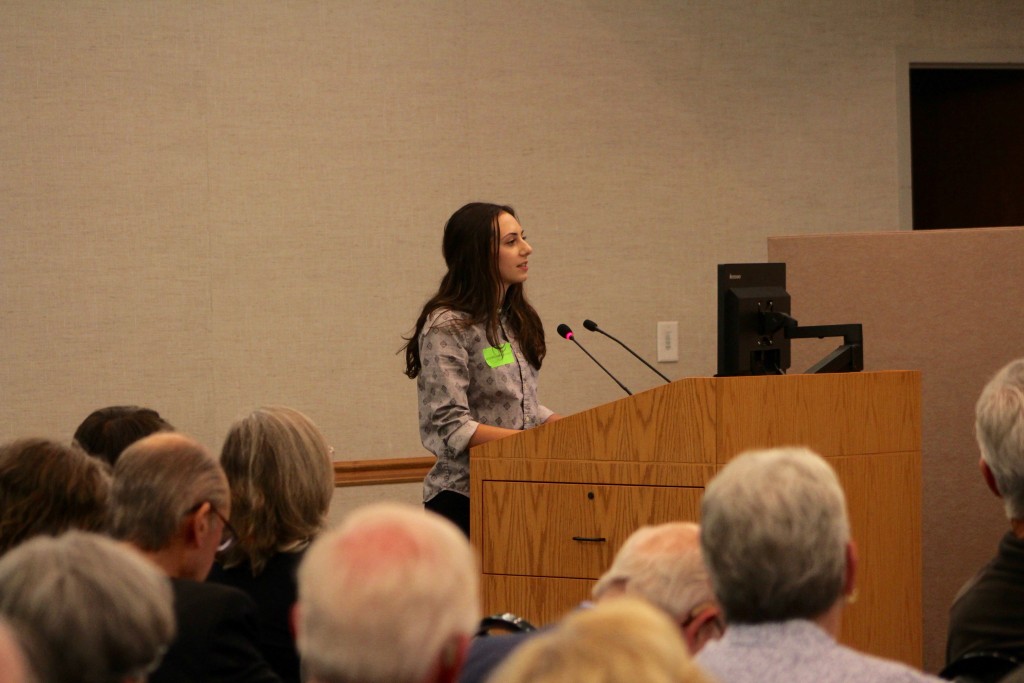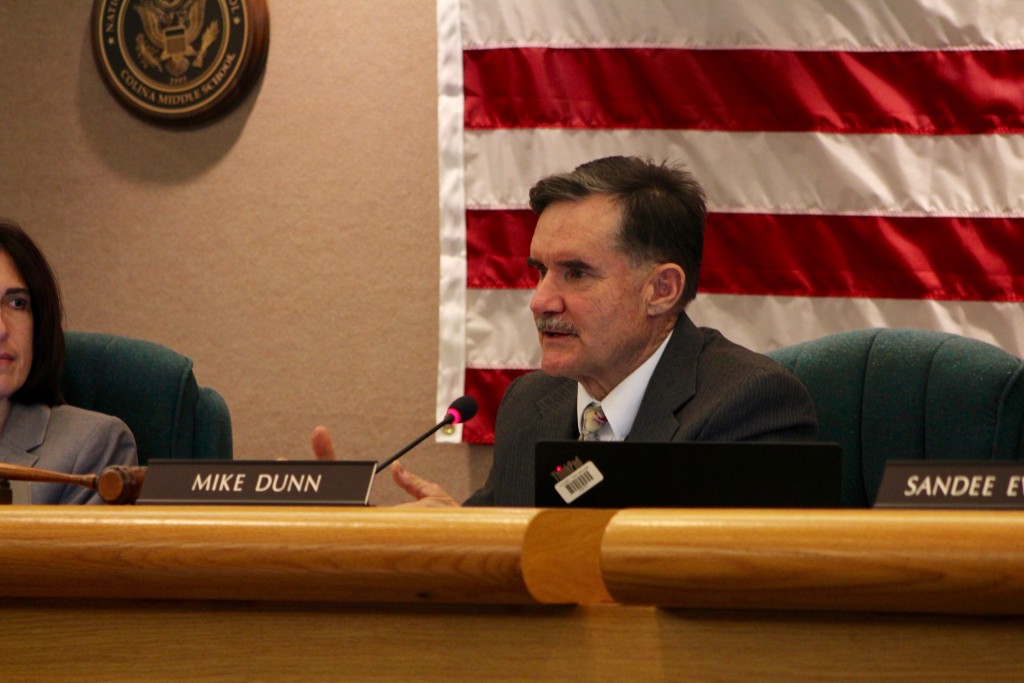School Board Approves Instruction Policy In Line With FAIR Act By Expanding Content to Include Contributions of LGBTQ and People With Disabilities
Community members and students alike flooded the school district office meeting room on the night of Jan.17, spilling into the reception area and filling the hallways, with even more livestreaming the school board meeting from their computers. Neon green stickers speckled the crowd, marking the supporters of one of the most controversial issues of the year.
Almost every attendee that night had come to find out whether the school board would adopt the Board Policy for History-Social Science Instruction that aligns with the FAIR Act.
In 2011, the state legislature passed the Fair, Accurate, Inclusive and Respectful Education Act (FAIR Act), or Senate Bill 48, to represent more people in history who were omitted unfairly in the past, and to include “both men and women, Native Americans, African Americans, Mexican Americans, Asian Americans, Pacific Islanders, European Americans, lesbian, gay, bisexual, and transgender Americans, persons with disabilities, and members of other ethnic and cultural groups” (additions marked in bold). While it is a state mandated law, local school boards control curriculum development and textbook adoption. Last summer, the State Board of Education adopted a framework to guide schools on how, what and when to teach the new History-Social Science content.
During their December meetings, the school board decided to postpone their vote on new policy for History-Social Science Instruction to Jan. 17 at the request of board member Sandee Everett. Over 45 people gave their opinions before the vote during the public comments time, during which members from all sides of the argument spoke, while some simply called for civility. The crowd that night was buzzing with anger, anxiety and apprehension, often cheering or applauding after speakers.

Thousand Oaks High School student Olivia Braheem voiced her opinions about the FAIR Act to her school board members and a large crowd of parents, teachers, community members, and students alike. She and several other TOHS students expressed their thoughts on upholding the FAIR Act, claiming that it must be implemented to ensure an inclusive curriculum.
Tim Cooley, father to five TOHS graduates and grandfather to a future TOHS student, is a protester of replacing the policy. He believes that as LGBT people are of different sexualities, discussing them would only be proper for sex education classes, and that parents should decide what their children hear in class.
“Who’s better equipped to make decisions on sexuality and sociality, parents or teachers?” Cooley said. “It’s our job as parents to teach them.”
Many of those who opposed changing the policy agreed, as did Robert White, commenter and father of five children with two currently in the district.
“I’ve influenced my kids, and so did my wife, more than anybody in this room or any school teacher ever has,” he said. “If we are going to have a law, let’s have a law that the parents do a better job at and spend more time with their kids on.”
Paula Lewis, a student in the district, mentioned a different reason for why she did not want the new content implemented, based on her own experiences in the classroom.
“Being in class with this (transgender) student, it was difficult to focus directly on the topics at hand. I was directed to focus on calling this person the right pronouns,” Lewis explained. “Putting this act into action would really detract the focus in high school and even in elementary school classrooms when you are focusing on having to change the pronouns and think twice about what you call people rather than focusing on learning the subjects that you come to public school to learn.”
However, proponents of the vote, particularly NPHS alumna Emma Rogers, combatted these views with one of their own. Co-founder of the NPHS Gay-Straight Alliance Club, Rogers said that when she formed the club, it was the first time she ever felt real hate, and believed it was not something randomly inspired.
“They didn’t learn that hatred at school, that’s what they learned at home, so when you guys talk about wanting to teach your children at home, I don’t trust you. We need something in schools to counterbalance it, and you can teach your kids what you want to teach them at home, but all that this FAIR Act is trying to do is show kids what exists in the world,” Rogers said.
Ella Fortney, TOHS junior, also spoke in favor of new policy.
“Children are going to learn about the LGBTQ community whether you approve of it or not, simply because they are a prominent part of our society. Learning about these topics in a historical context in school allows students to formulate their own opinions about this community rather than have the beliefs of others imposed on them,” Fortney argued.
Other arguments moved beyond the implementation of the FAIR Act, going into the details of what would happen if this board policy passed. Many acknowledged that changing the policy was necessary for following state law, but they did not want to use the framework adopted by the state. Heidi Neilson claimed that the framework was written by the LGBT community.
“Allowing a political activist group to write our children’s curriculum undermines the democratic process and is a lazy approach that places a political agenda above the deliberative and collaborative process,” Neilson said. In response, other commentators as well as board member Betsy Connolly disagreed that the LGBT community was the only advocacy group providing input to the state framework committee.
“You are correct that an advocacy group worked on behalf of the passage of SB 48. That’s the way senate bills work; if no one is an advocate for a particular bill it doesn’t get passed,” she said. “The state framework was influenced by this group and 200 other groups who came before the state framework committee to advocate for their particular perspective on the world. I think it’s a mischaracterization to suggest that any part of the state framework was written only by a specific group.”

CVUSD School Board President Mike Dunn addressed a large crowd of people who were eager to speak to the school board members on Tuesday, Jan. 10. Dunn, along with his fellow school board members Sandee Everett, Betsy Connolly, John Anderson, and Patricia H. Phelps, patiently listened as more than 45 speakers voiced their concerns on issues from the FAIR Act to Conejo Valley High School’s relocation.
As the night wore on, the same opinions were repeated and recapitulated, and met with continuous cheers and barks. After all the public comments, the board members were able to speak.
“The FAIR Education Act is the Law, so no one needs to be concerned that our district will not comply with the FAIR Education Act, because we most certainly will,” Clerk Sandee Everett started.
She proceeded to propose the board vote on the replacement policy with an amendment that included minor linguistic changes as well as the age appropriateness of the curriculum. She also wrote in a line that requires the superintendent to report on progress on curriculum development, and added three more education codes to the legal references. After a few grammar and stylistic mistakes suggested by Connolly, the board put it to a vote.
For clarity, board president Mike Dunn made the board vote twice, first to approve Everett’s amendment to the policy and then to approve the policy itself. Each motion passed 5-0, leading to happy cheers of supporters.
Dunn was surprised at the outcome of the night, but says the board accomplished what they needed to.
“That is what we wanted tonight, we wanted flexibility on that framework, so that we could modify the framework to fit in with our community standards. . . I did not think we would get a 5-0 vote, I thought it would be 3-2,” Dunn said.
Superintendent Ann Bonitatibus and Everett agreed with Dunn, saying they thought this was a good place to start, but Connolly was nervous about the future.
“I’m still a little worried that there are groups that might want to interfere with the process of curriculum development and the selection of textbook. I think the community needs to remain engaged, so that the end product of the curriculum development committees and the end product of the textbook selection is consistent with their values,” she said.
Photos by Caitlin Henderson/Prowler


